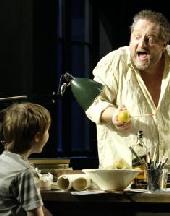SITE GUIDE
SEARCH
REVIEWS
FEATURES
NEWS
Etcetera and
Short Term Listings
LISTINGS
Broadway
Off-Broadway
NYC Restaurants
BOOKS and CDs
OTHER PLACES
Berkshires
London
California
DC
Philadelphia
Elsewhere
QUOTES
On TKTS
PLAYWRIGHTS' ALBUMS
LETTERS TO EDITOR
FILM
LINKS
MISCELLANEOUS
Free Updates
Masthead
Writing for Us
A CurtainUp  London Review
London Review
 London Review
London ReviewThe Life of Galileo
|
I love science but I love my friend more.
---- Galileo |

Ryan Watson as the boy Andrea Sarti and Simon Russell Beale as Galileo Galilei
(Photo: Catherine Ashmore) |
Directed by Howard Davies at the National Theatre's largest space and starring the magnificent Simon Russell Beale, it was always going to be an exciting if long, at three hours and a quarter, evening. What Hare seems to have accomplished is to place his Galileo, despite the modern dress, firmly in the seventeenth century rather than the Brechtian interpretation of seeing the "father of science" and philosopher in the context of the repression seen in Germany in the 1930s. He minimises the parallels between, the doctrinaire attitude of the Church and therefore the Establishment towards Science in sixteenth century Italy, and the rise of Fascism. The only homage to Brechtian context is in the opening of the final act with a scene straight out of a Berlin club of the kind we see in Cabaret with the interpretation of the debauchery of the Florentine Carnival.
By placing his cast in modern dress, Howard Davies makes sure that we recognise Galileo not just as an historical figure but as a man who stands up to be counted (although in old age he gives in to pressure and relents), in an empirical way, even when what he challenges is the bedrock of the Christian world . It was inconceivable that the Sun could be the centre of the universe and not the Earth where God's creation Man dwelt, because if this were true, where then would Heaven be? The set which is "open plan" in the Olivier is dominated by a giant moon, which serves to stress our small place in the scheme of things. Onstage is the open framework of an observatory dome. The music too is distinctly planetary in the creation of cosmic atmosphere.
Simon Russell Beale gives an amazing performance -- from the forty year old man of ideas, a teacher in 1609 who improves the telescope's design and magnification, forward to the year 1637 which finds him old and embattled, going blind and forced to abjure by the Church in Rome. The parallel between blindness and his abjuration does not go unnoticed. He isessentially a human, frustrated and sometimes angry figure. When his daughter's prospects of marriage and future are sacrificed to his ideas, he does not flinch.
The Life of Galileo is very much Simon Russell Beale's play. He is rarely off stage and firmly the centre of this thespian universe. Watching him with a cigarette in hand, we think back to those parts he has taken where he played embattled academics, Stoppard's Jumpers and Hampton's The Philanthropist, even Charlotte Jones' theoretical physicist in Humble Boy. He is adept at conveying a man deep in process, engaged with his own intellect, taking us on a whirlwind tour of the great Italian cities of the Renaissance, Padua, Venice, Florence and Rome, but without the architecture. At a masked ball in what is the centre of the religious world, Galileo says, "This is Rome. Even I must look like a slightly overweight Adonis".
A highlight scene has The Little Monk (Zubin Varla) describe the way of his parents' lifes, peasants, the order of things, toiling on the land, harvesting, the Church, Bible readings. It is a beautifully descriptive piece fully redolent of Italian peasant life as The Little Monk asks Galileo not to disrupt their way of life, their beliefs. Galileo knocks down these emotional pleas very easily with "Does virtue have to be the fruit of poverty? Can't the truth prosper without the Church?"
Much of the Second Act sees friends and family pressuring Galileo to conform. These efforts add to the sinister implicit threats of the Cardinal Inquisitor played for my taste with too much bonhomie by Oliver Ford Davies. In the final act Galileo, when faced with torture and death, makes the choice to take back his ideas ("better tainted than empty"), we cannot judge him. Only Andrea Sarti (Bryan Dick), Galileo's pupil can say with the impetuosity and idealism of youth, "So much is won when one man stands up and says No."
|
THE LIFE OF GALILEO
Written by Bertolt Brecht in a version by David Hare Directed by Howard Davies Starring: Simon Russell Beale, Zubin Varla, Oliver Ford Davies With: Ryan Watson, Julia Ford, Bertie Carvel, Tim McMullan, Duncan Bell, Elisabeth Dermot Walsh, Jamie Manton, Ian Barritt, Simon Merrells, Christopher Gilling, Dermot Kerrigan, Tristan Beint, Amit Shah, Andrew Woodall, Sam Spruell, Natalie Best, Lucy Vandi, Bryan Dick, Marcus Cunningham, Sarah Annis Design: Bunny Christie Music: Paddy Cuneen Choreographer: Stuart Hopps Lighting: Mark Henderson Sound: Paul Groothuis Running time: Three hours fifteen minutes with two intervals Box Office: 020 7452 3000 Booking at the Olivier to 31st October 2006 Reviewed by Lizzie Loveridge based on 6th July performance at the Olivier., Royal National Theatre, South Bank, London SE1 (Rail/Tube: Waterloo ) |
|
London Theatre Tickets Lion King Tickets Billy Elliot Tickets Mary Poppins Tickets Mamma Mia Tickets We Will Rock You Tickets Theatre Tickets |




